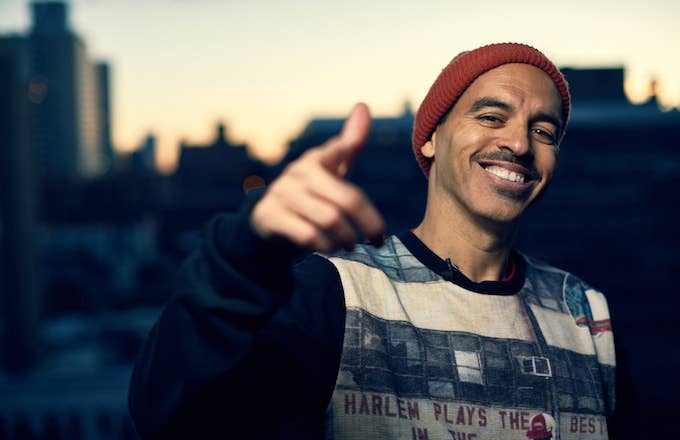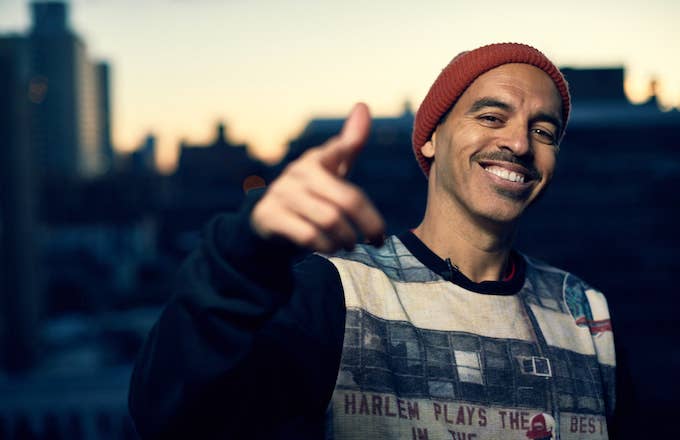
Bobbito Garcia is a name known to pretty much everyone who’s had anything to do with the fields covered in this publication. Whether it’s hip-hop, sneakers, or basketball, Garcia aka Kool Bob Love aka DJ Cucumber Slice has been innovating since the early 1990s. He was a host of arguably the most influential hip-hop radio show of all time, wrote the very first article ever about sneaker culture (and an influential book about its history, to boot), and made a documentary on the history of pickup basketball in New York City—and all that only scratches the surface of his accomplishments.
Garcia’s latest documentary Rock Rubber 45s—for which he is subject, director, producer, and music supervisor—traces his entire career, with all of its myriad twists and turns. It also gets personal, exploring his family history and some very difficult childhood experiences. As if that wasn't enough, it features interviews with everyone from Lin-Manuel Miranda to Patti LaBelle to Chris Paul to Rosie Perez. I called up Bobbito just minutes before the film’s U.S. premiere at the Kennedy Center to talk about how it all came together, and what it’s like to have your favorite rapper spit about your life.
If Rock Rubber 45s isn’t screening near you, you can cop it digitally on July 24. Check the film’s website for more info.
You directed and produced a documentary about not just one aspect about your career, but about your entire life. What was your range of feelings about it during the whole process? Did you ever feel like the project was self-indulgent?
I appreciate you asking that. I don't want to say self-indulgent cause it's not a one-person narrative. It's also the narrative of my parents, my family, and my community. It’s the voice of the sneaker community worldwide. Dating back to 1990, when I wrote the world's first article on sneaker culture in media history, what I learned immediately was that I never just speak for myself.
The response to that article when it went to print in 1991 was overwhelming. The editor-in-chief at The Source at that time was swarmed with letters. People were saying, “Finally, someone speaks my language.” Similarly, with my films I'm not just talking about basketball, sneakers, and music. I'm talking about educational quandaries, I’m talking about experiences with being abused as a child, I’m speaking about sensitive topics.
So no, it’s not self-indulgent. I've been inspired by a lot of phenomenal books that have been autobiographical. I wanted to challenge myself to be the first that I am aware of for the hip-hop generation to do an autobiographical film. That’s very different. I like to challenge myself. It's apparent in the film. When you look at all the career choices I have made I constantly challenge myself and this is no different.
One thing that runs through the film is that you get involved in the pioneering stages of different ventures. You tend to leave when they are still successful, but you're feeling creatively stagnated. What is behind that need to reinvent and challenge yourself?
I don't fully answer that in the film, because I don't fully know the answer either. I like to be challenged and I do not like to be stuck. I think what I am stuck about is this approach and mentality to being original.
I have grown up in New York and I am a part of the group that started sneaker culture. I am also a part of the group that experienced hip-hop as early as it existed. I’m also a part of this group that took playground basketball and was able to cement it in the public’s eyes as viable, outside of organized basketball. So because I was in on all those things so early, when they become part of the mainstream or part of mainstream consciousness or exposed... I mean, it's just the natural progression of anything. Someone at Complex gets an album six months before it’s in the public, it’s like, “Oh my god.” Then if it gets out to the public and it’s played on the radio or in the club, it’s still special because it's great music, but I’m sure like most forward-thinking people, you are on to the next: What else is out there?
I am constantly exploring. It's not human nature for everyone, but it's human nature for me: Constantly explore and to constantly push boundaries and constantly not feel comfortable.
This film deals with childhood sexual abuse. Why did you include that experience in the movie?
I learned very early as a public figure, the more vulnerable I am, the more real I am to people, the more people can identify with me. What I've seen with the less than handful of test screenings and the screening I recently did in Puerto Rico is that opening up about being abused as a kid, I’m not alone. There was one person during a Q&A at Puerto Rock Steady that completely broke into tears. I left the mic and went up to the audience and gave him a hug. It was a powerful moment, a heavy moment.
There's a lot of healing that needs to be had. There's a lot of language that we lack to deal with these issues. I hope that my film could be inspiring for people to open up about it. Hopefully it will be motivational for people to attempt to reconcile their past in whatever way that they deem is right for them. I feel like ultimately it’s a positive.
The closing credit song has Pharoahe Monch rapping about your life from a first-person perspective. What did you think when you first heard it?
Honestly, I was moved to tears, because I’ve had a hand in Monch’s career since 1989. I was handed his demo at Def Jam where I was an A&R rep to determine whether we should sign the group Simply II Positive MCs or not—the label passed on it. I held on to that demo when me and Stretch started doing a radio show. I played the tracks that were unreleased to our audience and eventually Monch and Prince Po came up to our show and crushed it on the mic. Then their album came out on Hollywood Basic, and then it didn’t do as well as we all thought it should have—it’s classic.
And Monch went on to be this incomparable MC. I don’t know anyone who has been making music as long as he has—1988, that's 30 years in hip-hop—being as prolific as he has been. I can't think of one artist who can say the same. So outside of being friends, there wasn’t an MC alive that I could think of that I would want to speak about my life. Luckily, he was available and interested. He just received a Grammy award for his work on the Miles Davis film [Miles Ahead]. The timing was just crazy. He made me lose some of my hairline trying to get him in the studio, but he crushed it. Literally, I was blown away.
The name of the film deals with the three fields in which you spent your life: basketball, sneakers, and music. Do you see any throughline between those things? What is it?
Yes, absolutely, and I encourage everybody to watch the film to find out what the answer is. [Laughs.] How do you like that answer, Complex?

